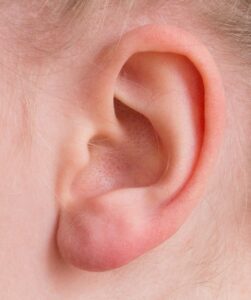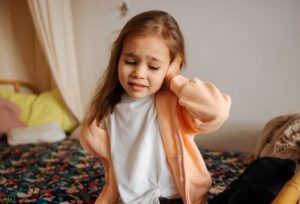As parents, our children's health is one of our top concerns. When a child has an ear infection, many parents wonder: will this condition heal on its own? This article will explore the possibility of self-resolution in children's ear infections, symptoms to watch for, and when to seek medical help.
What Is an Ear Infection?
An ear infection, or otitis media, refers to inflammation and infection in the middle ear (the space behind the eardrum). This issue is quite common in young children, especially infants, because their ear canals are shorter and more susceptible to infections. Ear infections are typically caused by bacteria or viruses, and symptoms include ear pain, fever, irritability, and hearing loss.
Types of Ear Infections
- Acute Otitis Media (AOM): This type of ear infection occurs suddenly and can cause significant discomfort, often requiring treatment.
- Otitis Media with Effusion (OME): This condition occurs when fluid remains in the middle ear after the infection has cleared. It can affect hearing but doesn’t necessarily indicate an active infection.
Can Ear Infections Heal on Their Own?
The Body's Natural Defenses
Many ear infections, particularly those caused by viruses, can resolve on their own without medical intervention. Research indicates that a significant percentage of children improve within a few days without antibiotic treatment.
According to the American Academy of Pediatrics, especially in children under two years old, the rate of natural recovery is quite high. However, the severity of symptoms and the overall health of the child play crucial roles in the healing process.
The Watchful Waiting Approach
For mild to moderate ear infections, many pediatricians recommend a "watchful waiting" approach. This means observing the child's symptoms for 24 to 48 hours before deciding on treatment. If symptoms are manageable and the child is otherwise healthy, this method can help avoid unnecessary antibiotic use.
During this observation period, we should pay attention to the following:
- Fever: If the child's temperature is elevated but manageable with fever-reducing medication, urgent treatment may not be necessary.
- Pain Level: If the child is uncomfortable but can still eat and play, this may be a positive sign.
- Behavior Changes: If the child becomes very irritable or lethargic, or if pain worsens, it's essential to consult a doctor.
When Should You Seek Medical Attention?
While many ear infections can resolve on their own, certain symptoms require prompt medical attention:
- High Fever: If the child's temperature exceeds 102°F (39°C) and persists for several days.
- Severe Pain: If the child experiences intense pain that isn't relieved by over-the-counter medications.
- Discharge: If there is pus or fluid coming from the ear, it may indicate a more serious infection.
- Hearing Issues: If the child is not responding to normal sounds or appears confused, there may be an ear problem.
- Frequent Infections: If the child has recurrent ear infections, further evaluation is needed.
Home Management of Symptoms
If your child has an ear infection and you're taking the watchful waiting approach, you can help alleviate symptoms in the following ways:
- Pain Relief: Over-the-counter medications like acetaminophen or ibuprofen can help relieve pain. Follow the dosing instructions from your doctor.
- Warm Compress: Applying a warm cloth to the ear can provide comfort.
- Stay Hydrated: Ensure your child drinks plenty of fluids to help thin mucus and relieve pressure.
- Elevate the Head: When sleeping, propping the child's head slightly can help reduce ear pressure.
Conclusion
Ear infections are a common health issue in children, but by monitoring symptoms, seeking timely medical advice, and taking preventive measures, we can effectively reduce their occurrence. If you notice any concerning symptoms in your child, don’t hesitate to consult a doctor to ensure their healthy and happy growth.
References
- American Academy of Pediatrics. "Ear Infections in Children." AAP.org.
- Mayo Clinic. "Ear Infection (Otitis Media)." MayoClinic.org.
- Centers for Disease Control and Prevention (CDC). "Ear Infections (Otitis Media)." CDC.gov.












